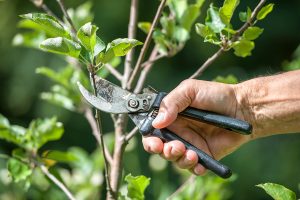
Make sure you prune the excess buds from your fruit tree for the healthiest fruit production (photo credit: BigStockPhoto.com)
April is National Gardening Month and we want to encourage everyone to get their hands dirty and experience the joys that can come from participating in producing your own food. While you may not think backyard gardening is a possibility here in the desert, you would be wrong.
You can absolutely grow food in your yard to supplement your family’s food supply no matter how dry the weather or hot the temps. The key is to know what to grow, when to plant, and how to handle the hottest months.
In honor of National Gardening Month, here are some tips for what you can do this month to start or tend your own backyard garden.
- Plant citrus trees. Growing your own citrus can help you stretch your family’s food dollar while also providing a healthy source of fruit. Plant a variety of trees that have staggered ripening timeframes so that you don’t end up with all your fruit ready to eat at the same time. Trees that are 2-5 years old are the best for transplanting.
- If you have existing fruit trees that grow apples, peaches, pears, or apricots, now is the time to thin the budding fruits to enable larger fruit to grow and to decrease the chances of branch breakage.
- Don’t prune fruit trees at this time unless you need to remove dead or dying branches.
- Don’t be concerned if you have an early drop of fruit, this is the natural thinning process that can be augmented by unseasonably warm weather.
- Transplant herbs that grow well during the warm spring season here in Arizona like basil, lavender, sage, and rosemary.
- Prune herbs and add compost to their soil.
- Plant seeds or transplant seedlings for warm-season loving vegetables like green beans, carrots, green onions, radishes, cucumber, lima beans, squash, and cantaloupe.
- Apply fertilizer and soil amenders to vegetables that have already gone in the ground.
- Watch for pests like aphids that show up as the weather begins to warm. Take steps to protect your vegetables like using shade cloths on tomato plants.
- Pay attention to the weather and adjust the amount of water you are giving the garden accordingly. Pay particular attention to unseasonably hot days which can cause rapid dehydration.
- Watch for wilting leaves and drooping plants which are both signs that your plants are not getting the water they need.
- Make sure you are providing your fruit trees with enough water to keep the soil moist which promotes fruit growth.
- Adjust your watering schedule as the temperatures rise. Remember, plants grow better with consistent access to water which means that watering deep is more important that watering often. Be sure you are providing enough water to wet the soil to a depth of 2 feet.
Related articles
- 8 Great Gardening Gifts (fillyourplate.org)
- What Kids Can Learn from Gardening (fillyourplate.org)
- Ask a Farmer: Starting a Family Garden (fillyourplate.org)

